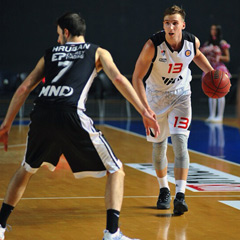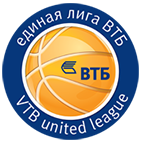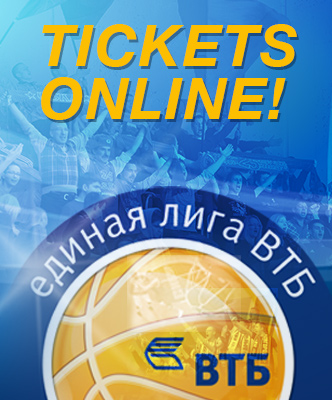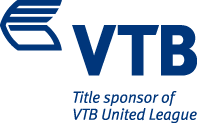10march
Vladislav Staratelev:
Everyone Prefers Playing To Practicing

One of Russia's brightest young talents, guard Vladislav Staratelov, has taken a big step forward in his career this season. Instead of sitting on the bench at a top club and winning another youth league title, he chose to hunt for playing time outside of Russia. Now Staratelov is leading the league in minutes for players under age 20.
The 19-year-old averages 27.3 minutes per game at Vita, tops in the league in his age group. Second in the ranking is Zenit's Grigory Motovilov, who averages 14.4 minutes per game. Motovilov has also only appeared in five Zenit games, while Staratelov has played in 15 for Vita, averaging 8.2 points per game.
Vladislav Staratelov spoke with VTB-League.com about his playing time and what it's like adapting to professional basketball, shared his experience of playing in a foreign country, recalled playing against former club CSKA and talked about Georgia's famous hospitality.
- Playing for Vita, you've been able to play a lot of minutes in a strong league, something that many young players miss out on. Is that better than sitting on the bench at a top club?
- Yeah, that's right. I could sit on the bench and not get any game experience. You can't make a lot of progress by only practicing. You need regular game exposure to strong teams and players. A game is totally different. You get to develop your sense for the game and how to make the right decision in different situations. You gain experience with each outing. If you played poorly, you can analyze what you did wrong, so you don't make the same mistake again. If you played well - awesome. Your confidence grows exponentially.
With Vita, I get to play against various high-quality teams, including some of the Euroleague's best teams. You can't get that type of experience in practice. I can tell how I've improved. I'm a different player than I was half a year ago. Yes, I got the experience I needed at the time playing for CSKA. But it was important to take a step forward and keep moving. I'm happy that I had this opportunity at a VTB League club.
- What was the most difficult part about transitioning to professional basketball?
- The most difficult thing was leaving my home and my city, where I had played my entire life. I had to learn how to be independent and cook my own food and do the laundry. But I got used it pretty quickly. I'm an independent guy and figured out what to do (laughs).
Another challenge was adjusting to practices in English. When coach started talking quickly, I didn't always know what I was supposed to do. But thanks to being exposed to it every day, my English has improved rapidly. Now I don't have any trouble with the language.
I didn't have any big issues with the game itself. There isn't much time to think when you're playing at the VTB United League level. You have to make decisions very quickly on the court. I really wanted to come here and get a feel for professional basketball and work on my game every day. That desire has outweighed any difficulties related to my lack of experience and youth.
- You average almost 30 minutes per game in the league at 19 years of age. Is it too much? Are you able to recover after games?
- It's not bad. The burden is completely fine. The more game experience, the better. The NBA has an 82-game regular season and no one complains. Everyone likes to play instead of practice, right? The main thing is that you need to take the right approach to your body. You need to take care of it and know how to recover. Plus, it's important to get a good foundation during the preseason.
Before and after practices with games, I make sure to stretch my muscles with a massage roller, so they aren't wobbly. After games, I always ice my legs. Sometimes I go to the banya. Plus, I take various vitamins. Together, it all helps me recover and stay strong.
- You started this season at another club, VEF. But you didn't end up playing a single game for them in the league. What happened?
- I spent the preseason with VEF. As the season approached, all the foreigners were supposed to get residency in Latvia. I submitted the documents, but found out two weeks later that Russian citizens also have to submit a certificate of no criminal record, which take a month to process in Russia.
The season started and I couldn't play. By early November, everything was ready and I finally got my residency. But by then a lot of time had passed. The team had already played quite a few games in the VTB League and Latvian league and was starting to gel. Plus, VEF had seven foreigners and only six are allowed on the VTB League roster. According to the coach, though he didn't talk with me much, I didn't fit with the team despite playing well in practice. I was desperate to get on the court and play, so when the Vita option appeared, I accepted right away.
- What's it like to be the only Russian player on a foreign team?
- It's unusual and not something I'm used to. I love contributing to a good atmosphere in the locker room and joking around. But I can't express my emotions in English and tell stories. On the other hand, I try to teach my teammates Russian words and expressions. They teach me and I teach them. Now I know a lot of words and expressions in Latvian and Georgian.
As far as basketball goes, it's hard to be a foreigner. Usually foreigners are leaders and expected to have a big impact. More is expected. You have to be twice as good as the local players. Being a Russian player on a Russian team is a lot easier, I think.
- Against the league's top teams--CSKA, Khimki and UNICS--you scored in double digits. Was that a coincidence or were you especially fired up to play against them?
- To be honest, I take the same approach to each game. Although it's possible that I'm extra motivated against teams like that. I want to prove to myself that I can hold my own at age 19. When you play against the top teams in Europe, against players that you used to watch on TV and on the internet, you want to be at your best.
Of course, I especially remember the game vs. CSKA this season. I had to look good in my home arena with my parents, relatives and a lot of friends watching me play. Those types of moments are what make basketball worth it.
- What elements of the game do you need to work on?
- There's plenty to work on: my ability to go 1-on-1, perimeter shooting, mid-range jumper and driving the paint, playing coast-to-coast. It's a lot of work!
I need to improve my court vision and passing. I've spent a lot of time on that recently. Vita head coach Nikolai Mazurs often has me play point guard in practice, so that I can practice my passing. I polish those skills in the Georgian league and I can tell that I'm getting better. It's more difficult in the VTB League. But I believe it'll come with time.
I also need to improve my field-goal percentage. I don't get a lot of open looks. I create most of my own shots, which is why I miss a lot.
- Playing for Vita and living in Georgia, how much interest is there in basketball from the local fans? Could they pack out arenas again, like in Soviet times?
- People are interested in basketball, but I wouldn't say it's that popular yet. It needs time and there have to be wins, of course. Although, with each home game in the VTB League, we've had more and more fans. Against Kalev and Vita, when Vita lost in the final minutes, we showed that we can be competitive and deserve support.
Our most recent game against Enisey was in Kutaisi. That's definitely a basketball city. The arena was full and we had great support. The atmosphere was amazing, even though Vita is not the local team.
- What can you say about Georgia's trademark hospitality? Have you experienced it yourself?
- The people in Georgia are extremely hospitable and friendly. Everyone on our team is ready to help out in any situation, accept me as a brother and show me around the city.
Yes, I do have one story. I celebrated my first New Year alone in Tbilisi, without any relatives or close friends. But Vita teammate Levan Shengelia invited me to his house and introduced me to his parents, wife and brother. They were very warm and it was nice. I got to experience a genuine Georgian New Year. It was very beautiful, with songs and plenty of delicious Georgian food.












































